Unit 2 Great People 单元知识点课件(共85张PPT)
文档属性
| 名称 | Unit 2 Great People 单元知识点课件(共85张PPT) |
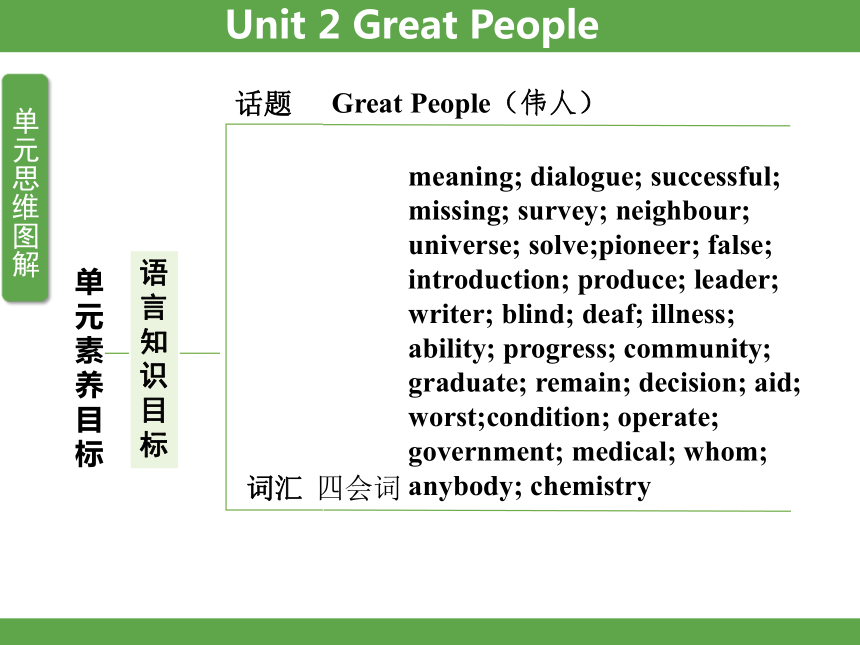
|
|
| 格式 | pptx | ||
| 文件大小 | 409.4KB | ||
| 资源类型 | 教案 | ||
| 版本资源 | 冀教版 | ||
| 科目 | 英语 | ||
| 更新时间 | 2024-07-03 00:00:00 | ||
图片预览


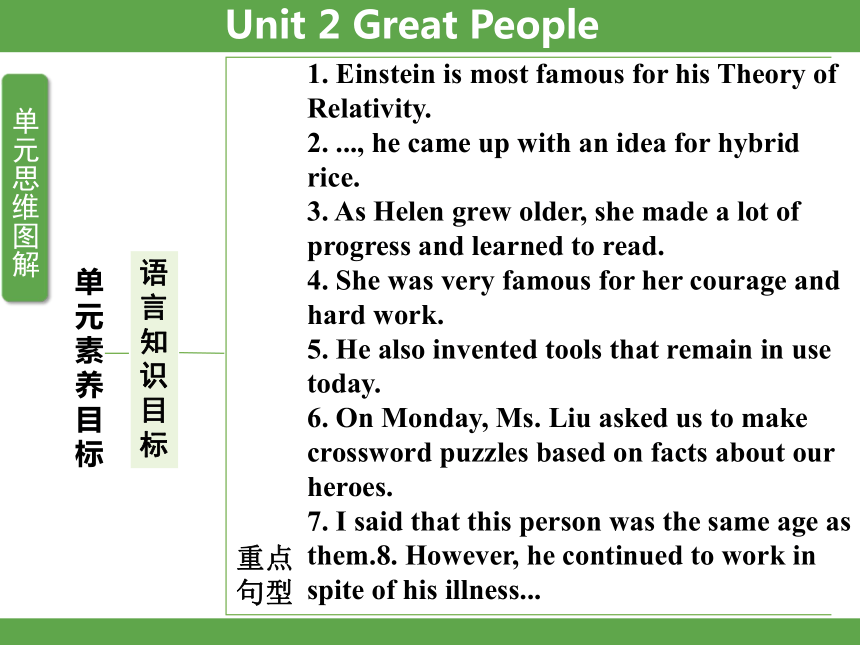
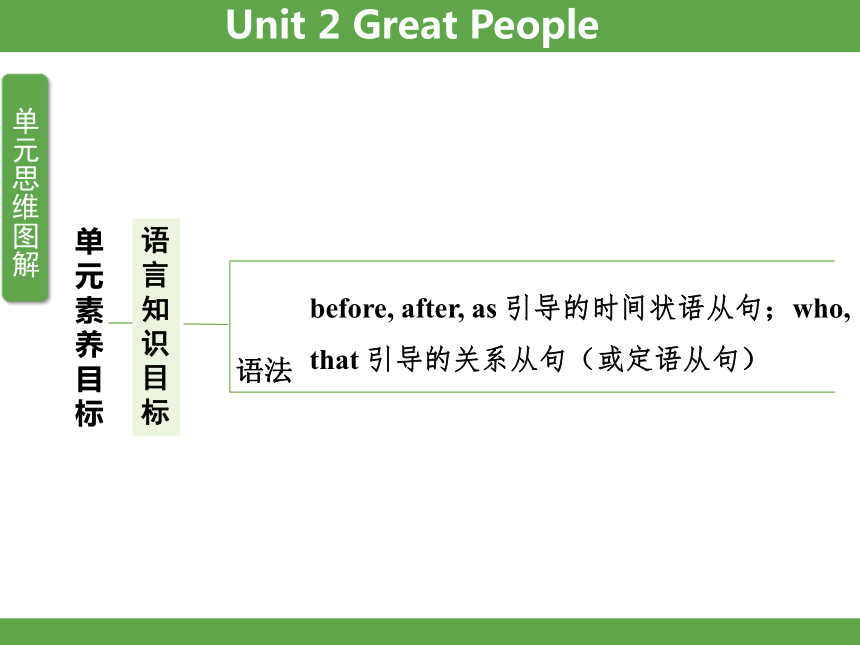
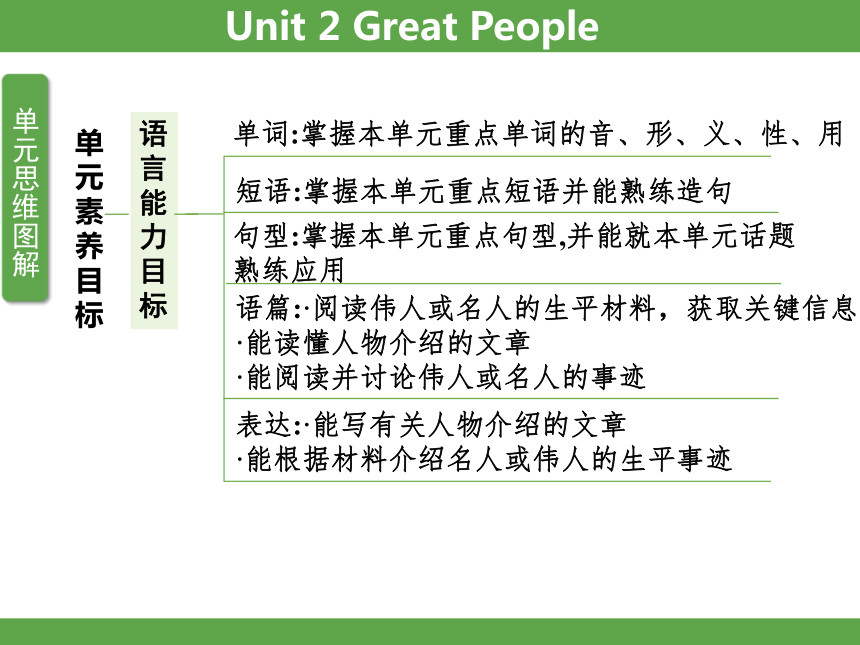

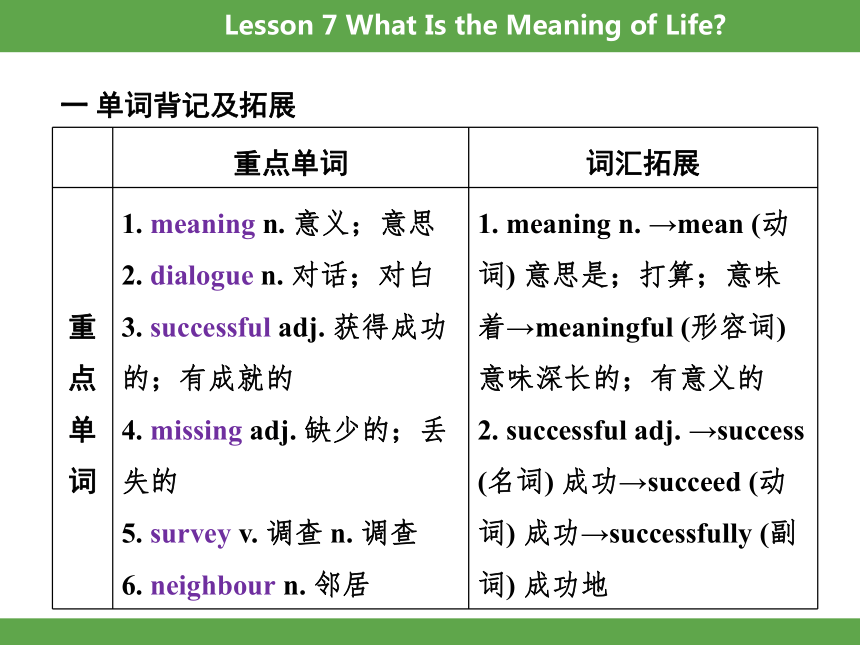
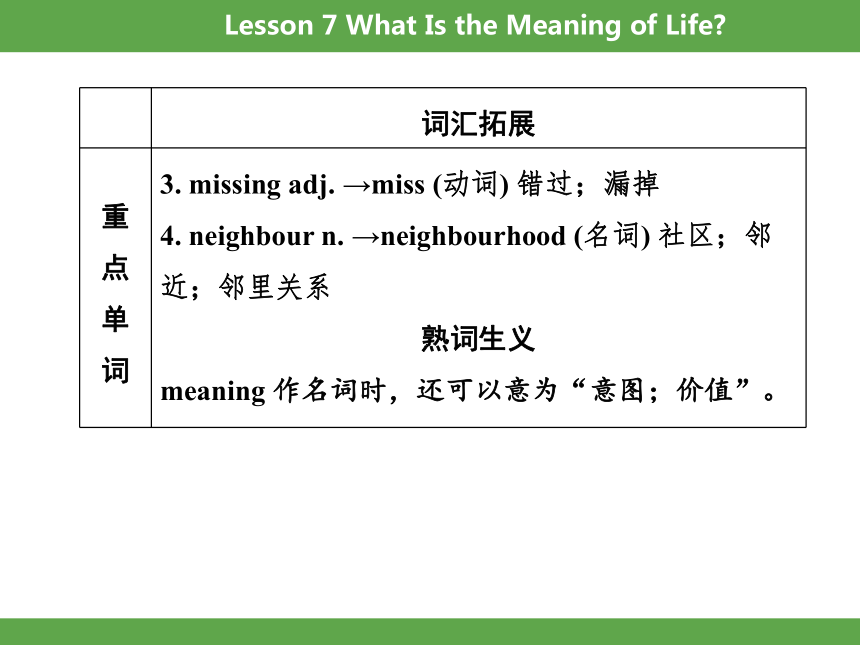
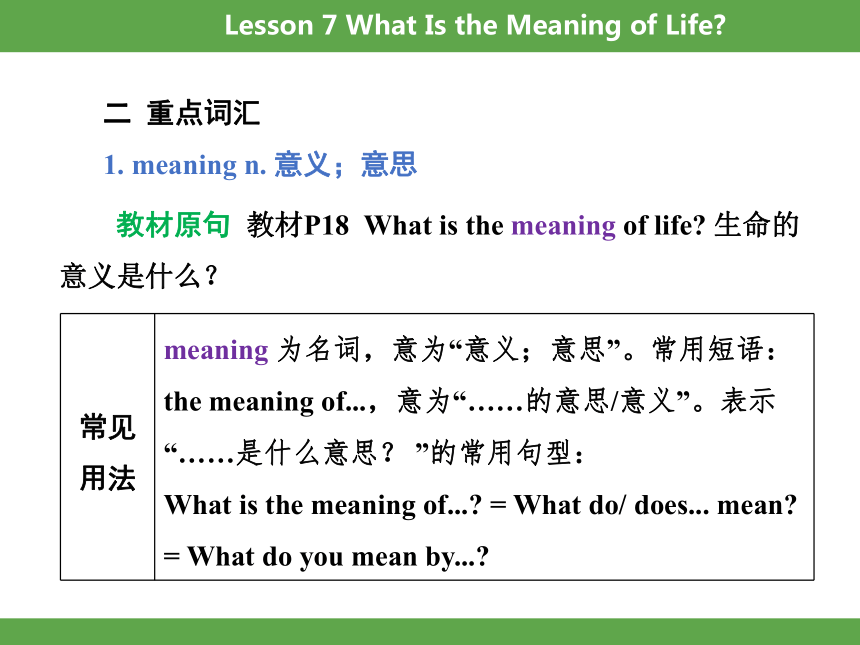
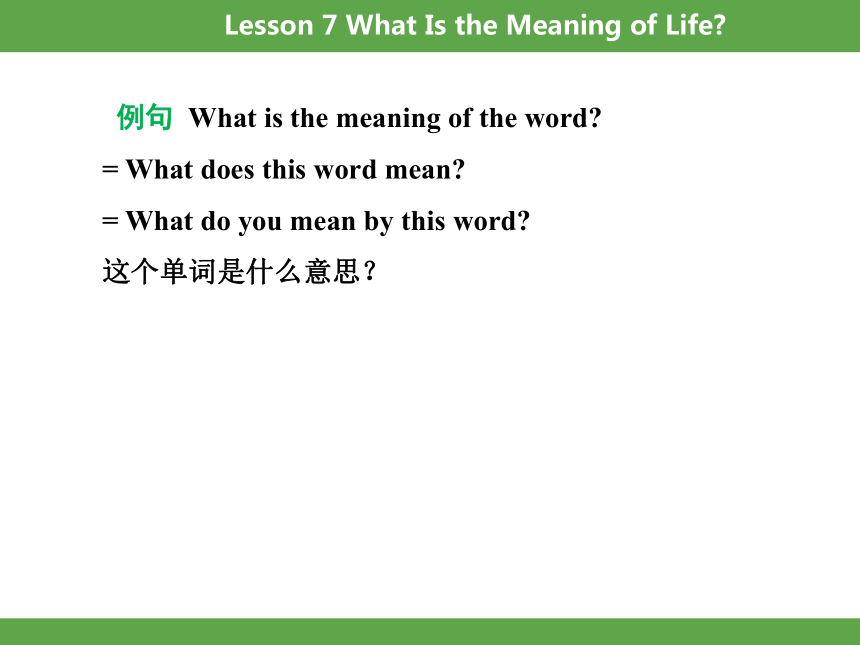
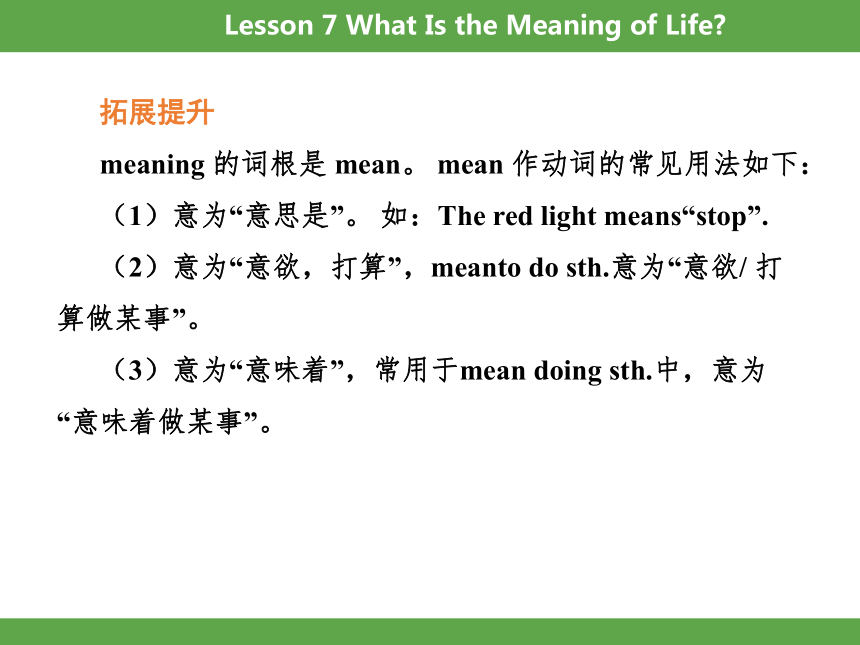
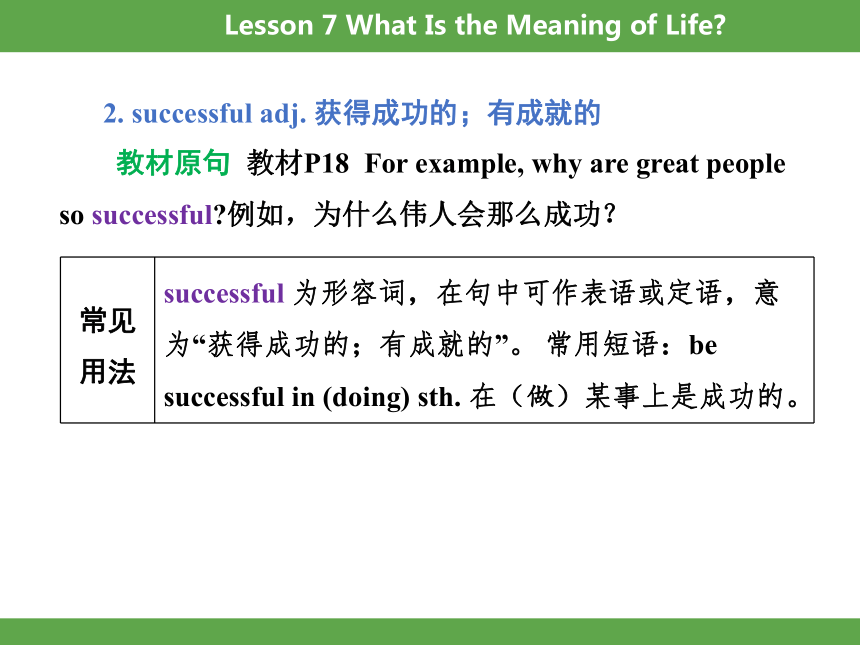
文档简介
(共85张PPT)
语
言
知识目
标
单元素养目标
词汇
话题
Great People(伟人)
四会词
meaning; dialogue; successful; missing; survey; neighbour; universe; solve;pioneer; false; introduction; produce; leader; writer; blind; deaf; illness;
ability; progress; community; graduate; remain; decision; aid; worst;condition; operate; government; medical; whom; anybody; chemistry
Unit 2 Great People
语
言
知识目
标
单元素养目标
词汇
非四
会词
lifetime; theory; relativity; nuclear; weapon; conclusion; peanut; hybrid;
variety; production; super; planetary; educator; greatly; anti - ; crossword;puzzle; based; Switzerland
Unit 2 Great People
重点
短语
deep in thought; succeed in; go on;
in the field of...; pass away; together with...;
fall behind; make a lot of progress; remain
in use; be well known for...; make a decision;
first aid; day after day; set up; based on...
语
言
知识目
标
单元素养目标
1. Einstein is most famous for his Theory of Relativity.
2. ..., he came up with an idea for hybrid rice.
3. As Helen grew older, she made a lot of progress and learned to read.
4. She was very famous for her courage and hard work.
5. He also invented tools that remain in use today.
6. On Monday, Ms. Liu asked us to make crossword puzzles based on facts about our
heroes.
7. I said that this person was the same age as them.8. However, he continued to work in spite of his illness...
重点
句型
Unit 2 Great People
语
言
知识目
标
单元素养目标
before, after, as 引导的时间状语从句;who, that 引导的关系从句(或定语从句)
语法
Unit 2 Great People
Unit 2 Great People
语言能力目标
单元素养目标
单词:掌握本单元重点单词的音、形、义、性、用
短语:掌握本单元重点短语并能熟练造句
句型:掌握本单元重点句型,并能就本单元话题
熟练应用
语篇:·阅读伟人或名人的生平材料,获取关键信息
·能读懂人物介绍的文章
·能阅读并讨论伟人或名人的事迹
表达:·能写有关人物介绍的文章
·能根据材料介绍名人或伟人的生平事迹
● 考点清单解读
一 单词背记及拓展
二 重点词汇
Lesson 7 What Is the Meaning of Life
一 单词背记及拓展
重点单词 词汇拓展
重 点 单 词 1. meaning n. 意义;意思 2. dialogue n. 对话;对白 3. successful adj. 获得成功的;有成就的 4. missing adj. 缺少的;丢失的 5. survey v. 调查 n. 调查 6. neighbour n. 邻居 1. meaning n. →mean (动词) 意思是;打算;意味着→meaningful (形容词) 意味深长的;有意义的
2. successful adj. →success (名词) 成功→succeed (动词) 成功→successfully (副词) 成功地
Lesson 7 What Is the Meaning of Life
词汇拓展
重 点 单 词 3. missing adj. →miss (动词) 错过;漏掉
4. neighbour n. →neighbourhood (名词) 社区;邻近;邻里关系
熟词生义
meaning 作名词时,还可以意为“意图;价值”。
Lesson 7 What Is the Meaning of Life
二 重点词汇
1. meaning n. 意义;意思
教材原句 教材P18 What is the meaning of life 生命的意义是什么?
常见用法 meaning 为名词,意为“意义;意思”。常用短语:the meaning of...,意为“……的意思/意义”。表示“……是什么意思? ”的常用句型:
What is the meaning of... = What do/ does... mean = What do you mean by...
Lesson 7 What Is the Meaning of Life
例句 What is the meaning of the word
= What does this word mean
= What do you mean by this word
这个单词是什么意思?
Lesson 7 What Is the Meaning of Life
拓展提升
meaning 的词根是 mean。 mean 作动词的常见用法如下:
(1)意为“意思是”。 如:The red light means“stop”.
(2)意为“意欲,打算”,meanto do sth.意为“意欲/ 打算做某事”。
(3)意为“意味着”,常用于mean doing sth.中,意为“意味着做某事”。
Lesson 7 What Is the Meaning of Life
2. successful adj. 获得成功的;有成就的
教材原句 教材P18 For example, why are great people so successful 例如,为什么伟人会那么成功?
常见用法 successful 为形容词,在句中可作表语或定语,意为“获得成功的;有成就的”。 常用短语:be successful in (doing) sth. 在(做)某事上是成功的。
Lesson 7 What Is the Meaning of Life
例句 Keep on doing, and you will be successful one day. 坚持下去,迟早有一天你会成功的。
What a successful speech Cathy has made after getting ready for it for a long time! 经过长时间的准备,凯茜的演讲多么成功啊!
Lesson 7 What Is the Meaning of Life
拓展提升
其他表示“成功”的英语词汇:
(1)success n. 成功
用法 :have success in (doing)sth. 在……方面取得成功
(2)succeed v. 成功
用法:succeed in doing sth. 成功做某事
(3)successfully adv. 成功地
Lesson 7 What Is the Meaning of Life
● 考点清单解读
一 单词背记及拓展
二 重点词汇
三 重点句式
Lesson 8 A Universe of Thought
一 单词背记及拓展
重点单词 词汇拓展
重 点 单 词 1. universe n. 宇宙;万象 2. solve v. 解决;解答 3. pioneer n. 先锋;先驱 4. lifetime n. 一生;终生 5. theory n. 理论;学说 6. conclusion n. 结论 7. false adj. 错误的;假的 1. solve v. →solved (过去式/过去分词) 解决;解答
→solution (名词) 解决办法;解答
2. pioneer n. →pioneers (复数) 先锋;先驱
Lesson 8 A Universe of Thought
词汇拓展
重 点 单 词 3. conclusion n. →conclude (动词) 结束;推断
4. false adj. →true (反义词) 正确的;真实的
熟词生义
solve 作动词时,还可以意为“破解;处理”。
Lesson 8 A Universe of Thought
二 重点词汇
1. mind n. 有智慧的人;有才智的人
教材原句 教材P20 Albert Einstein was one of the greatest minds of the last century. 艾伯特·爱因斯坦是上世纪最有才华的人之一。
常见用法 mind 在此处作名词,意为“有智慧的人;有才智的人”,还可以表示“头脑;精神;心思”。常见的短语有:change one’s mind 改变某人的主意;make up one’s mind 做出决定;keep... in mind 将……
记在心中;never mind 不要紧。
Lesson 8 A Universe of Thought
例句 Swimming alone in the river is dangerous. We must keep it in our mind. 一个人在河里游泳很危险。 我们必须把它记在心里。
Lesson 8 A Universe of Thought
拓展提升
mind 作动词时,意为“介意,在乎”,后接名词、代词、动名词或从句。 常用 句 型 为 “Would/ Do you mind (not) doing sth. ”,意为“你介意(不)做某事吗? ”。表示不介意时,常用“Of course not . ”等;表 示 介 意时,可以用“You’d better not./ I’m sorry, but...”等。
Lesson 8 A Universe of Thought
2. solve v. 解决;解答
教材原句 教材P20 During his lifetime, Einstein thought about the universe and solved many problems in physics. 在他的一生中, 爱因斯坦思考关于宇宙的问题并解决了许多物理学难题。
常见用法 solve 为及物动词,意为“解决;解答”。 表示“解决问题,算出来”时,相当于 work out。
例句 New technology solves old problems but it may also create new ones. 新技术解决旧问题,但也可能创造新问题。
Lesson 8 A Universe of Thought
拓展提升
solution 为名词,意为“解决方法”。 搭配:a/the solution to the problem 解决问题的方法。
易错提示
solve 常与 problem 连用;answer常与 question 连用。
Lesson 8 A Universe of Thought
3. be famous for 因……而出名
教材原句 教材P20 Einstein is most famous for his Theory of Relativity. 爱因斯坦最著名的是他的相对论。
常见用法 be famous for 意为“因……而出名”,for 后接表示人或事物某方面的特点、特长的名词(短语),相当于 be known for。
看图背例句
China is famous for the Great Wall. = China is known for the Great Wall.
中国因长城而出名。
Lesson 8 A Universe of Thought
拓展提升
(1)be famous as意为“作为……而出名”,as 后
接表示身份或职业的名词(短语),相当于 be known as。 如:He is famous as a writer. 他作为作家而出名。
(2)be famous to 意为“为……所熟知”,to 后接表示范围的名词(短语),相当于 be known to。 如:The singer is famous to most young people. 这个歌手为大多数年轻人所熟知。
Lesson 8 A Universe of Thought
三 重点句式
go on to do sth. 的用法
教材原句 教材P20 After he finished school, he went on to study physics in Switzerland. 毕业之后,他继续在瑞士研究物理。
常见用法 go on to do sth.意为“(完成某事后)接着做另一件事”。 注意go on 表示“继续,继续下去”。
例句 After finishing his homework, he went on to read the text. 做完作业后,他接着读课文。
Lesson 8 A Universe of Thought
拓展提升
go on doing sth.表示“继续做某事”,或间断后继续做原来没有完成的事情。 如:She was so tired that she couldn’t go on walking. 她太累了以至于不能继续走下去。
Lesson 8 A Universe of Thought
● 考点清单解读
一 单词背记及拓展
二 重点词汇
三 重点句式
Lesson 9 China’s Most Famous“Farmer”
一 单词背记及拓展
重点单词 词汇拓展
重 点 单 词 1. introduction n. 采用;引进;推行 2. leader n. 领导者;领袖 3. produce v. 生产;出产 4. peanut n. 花生 5. variety n. 品种;变化 6. production n. 生产,制造 1. introduction n. →introduce (动词) 介绍;引进
2. leader n. →lead (动词) 领导;指挥
3. produce v. →production (名词) 生产,制造
Lesson 9 China’s Most Famous“Farmer”
词汇拓展
重 点 单 词 →produces (第三人称单数) 生产;出产
→produced (过去式/过去分词) 生产;出产
4. peanut n. →peanuts (复数) 花生
5. variety n. →varieties (复数) 品种;变化
熟词生义
produce 作动词时,还可以意为“引起;造成”;作名词时,意为“农产品”。
Lesson 9 China’s Most Famous“Farmer”
二 重点词汇
at the age of... 在……岁时
教材原句 教材P22 Yuan Longping, the great scientist, passed away at the age of 91 in Changsha on May 22, 2021. 伟大的科学家袁隆平于 2021 年 5 月 22 日在长沙逝世,享年 91 岁。
常见用法 at the age of... 意为“在……岁时”,of 后接基数词,表示年龄。at the age of...可位于句首或句末,在功能上相当于 when 引导的时间状语从句。
Lesson 9 China’s Most Famous“Farmer”
例句 He began to work at the age of 21. 他 21 岁时开始工作。
Lesson 9 China’s Most Famous“Farmer”
拓展提升
表示年龄的结构还有:
(1)at age+基数词
(2)at+基数词
(3)when 引 导 的 时 间 状 语从句
(4)in one’s+整十倍数的基数词的复数形式
如 :He began to work at age21. 他 21 岁时开始工作。
三 重点句式
1. as... as...的用法
教材原句 教材P22 In the dream, he grew a new type of rice that was as big as a peanut. 在梦中,他种植了一种和花生一样大的新型水稻。
常见用法 as... as...用于两事物之间的同级比较。 第一个 as 为副词,第二个 as 可作介词(后接名词或代词)或连词(后接从句),两个 as之间用形容词或副词的原级。 否定形式为 not as/ so... as...。
Lesson 9 China’s Most Famous“Farmer”
小助记
同级比较方法
同级比较用原级,
as... as...来帮忙。
若是否定加 not,
后者总是程度强。
Lesson 9 China’s Most Famous“Farmer”
例句 She sings as well as her sister. 她唱歌和她姐姐一样好。
2. 年代的英语表达法与 come up with 的用法
教材原句 教材P22 In the 1960s, a few years after he finished his studies in agriculture at university, he came up with an idea for hybrid rice. 20 世纪 60 年代,在他完成了大学的农业研究之后的几年,他产生了研究杂交水稻的想法。
常见用法 (1)in the 1960s 意为“20 世纪 60 年代”。 表示“在多少世纪多少年代”应该用“in the+世纪数(实际数-1)+年代数+s/ ’s”结构。
(2)come up with 意为“提出;想出(主意、答案等)”,后面常接名词或代词作宾语。
Lesson 9 China’s Most Famous“Farmer”
拓展提升
come up with 一般不用于被动语态,相当于think of。 如:We can come up with/ think of our own ideas and learn more through discussion. 我们可以提出自己的想法,通过讨论进一步学习。
Lesson 9 China’s Most Famous“Farmer”
3. together with 的用法
教材原句 教材P22 In 1973, together with other scientists, he succeeded in developing hybrid rice. 在 1973 年, 他和其他的科学家们一起成功地培育出杂交水稻。
常见用法 together with 表示“同……一起”,后跟名词(短语)或代词作宾语。“together with+宾语”位于句中时,一般要用逗号与前后内容隔开。 together with...相当于 with 或 along with。
Lesson 9 China’s Most Famous“Farmer”
易错提示
当主语后面 跟with, together with, except, as well as, rather than 等构成的短语时,谓语动词的单复数形式应与主语保持一致。如:His parents as well as he are very nice to me. 他的父母和他都对我非常好。
Lesson 9 China’s Most Famous“Farmer”
例句 Susan, together with her grandma, lives a happy and peaceful life. 苏珊和她的奶奶过着幸福安宁的生活。
● 考点清单解读
一 单词背记及拓展
二 重点词汇
Lesson 10 Touch the World
一 单词背记及拓展
重点单词 词汇拓展
重 点 单 词 1. writer n. 作家 2. blind adj. 失明的;瞎的 3. deaf adj. 失聪的;聋的 4. illness n. 疾病 5. ability n. 能力 6. progress n. 进步;进展 7. community n. 社区;社会8. greatly adv. 非常;很 1. writer n. →write (动词) 写;写作
2. illness n. →disease (同义词) 疾病
→ill (形容词) 生病的
3. ability n. →abilities (复数) 能力
Lesson 10 Touch the World
词汇拓展
重 点 单 词 4. greatly adv. →great (形容词) 伟大的;美妙的
熟词生义
1. blind 作形容词时,还可以意为“盲目的;视而不见的”。
2. deaf 作形容词时,还可以意为“充耳不闻的;不愿意听的”。
Lesson 10 Touch the World
二 重点词汇
1. illness n. 疾病
教材原句 教材P24 Before her illness, Helen was a bright and happy girl. 在生病之前,海伦是一个聪明、快乐的女孩。
常见用法 illness 作名词,意为“疾病”,是由形容词 ill 加名词后缀-ness构成的,相当于 sickness。
Lesson 10 Touch the World
例句 The report on the patient’s illness caught attention of the public.病人的病情报告引起了公众的注意。
Lily is absent from school because of her serious illness. 莉莉因为重病没来上学。
Lesson 10 Touch the World
易混辨析
illness 与 disease
Lesson 10 Touch the World
易混词 用法
illness 指患病的不适状态,。不指具体的疾病。如:
a strangeillness 奇怪的疾病。
disease 指具体的疾病,尤指会传染或影响身体某部位的疾病。
如:heart disease 心脏病。
2. progress n. 进步;进展
教材原句 教材P24 As Helen grew older, she made a lot of progress...随着海伦逐渐长大,她取得了很大进步……
常见用法 progress 为不可数名词,意为“进步,进展”。 make progress 表示“取得 进 步 ”, 在 某 方 面 取 得 进 步 常 用 make progress in...。progress 前可加 great, good, much, rapid, a lot of 等说明程度。
Lesson 10 Touch the World
例句 Chinese scientists have made great progress in medical research.中国科学家在医学研究方面取得了巨大进步。
What big progress they have made in the past two months! 在过去的两个月里他们取得了很大的进步呀!
Lesson 10 Touch the World
拓展提升
progress 还可 以用作动词,意为“进步;发展;提高;改进”。 如:It’s unbelievable that techno_x0002_logy has progressed in such a rapid way! 科技以如此迅速的方式进步,真是令人难以置信!
He continues to progress in his studies. 他在学习上不断进步。
Lesson 10 Touch the World
● 考点清单解读
一 单词背记及拓展
二 重点词汇
三 重点句式
Lesson 11 To China, with Love
一 单词背记及拓展
重点单词 词汇拓展
重 点 单 词 1. remain v. 仍然是;保持不变 2. decision n. 决定 3. worst adj. & adv. (bad 或 badly的最高级)最坏的(地);最糟的(地) 4. condition n. 环境;条件;状态,状况 1. decision n. →decide (动词) 决定
2. worst adj. & adv. →bad/ badly (原级) 坏的(地);
糟的(地)→worse (比较级) 更坏的(地);更糟的(地)
Lesson 11 To China, with Love
重点单词 词汇拓展
重 点 单 词 5. government n. 政府 6. medical adj. 医学的;医疗的 7. graduate v. 毕业 8. aid n. 帮助;援助 9. operate v. 动手术,做手术 3. medical adj. →medicine (名词) 药;医学
4. graduate v. →graduation (名词) 毕业
5. operate v. → operation (名词) 手术
Lesson 11 To China, with Love
熟词生义
重点 单词 remain 作动词时,还可以意为“剩余;逗留,留下”。
Lesson 11 To China, with Love
二 重点词汇
1. remain v. 仍然是;保持不变
教材原句 教材P26 He also invented tools that remain in use today.他还发明了今天仍然在使用的工具。
常见用法 remain 意为“仍然是;保持不变”,为连系动词,后跟形容词、名词或介词短语作表语。 remain 通常不用于进行时态。
Lesson 11 To China, with Love
例句 You have the right to remain silence if you choose. 如果你愿意,你有权保持沉默。
拓展提升
remain作不及物动词的用法:
(1)逗留,留下。如:The plane remained on the ground. 飞机仍未起飞。
(2)剩余,继续存在。 如:Few people remained in the meeting room. 会议室的人所剩无几。
Lesson 11 To China, with Love
2. decision n. 决定
教材原句 教材P26 In 1938, he made a decision to go to northern China because he knew many people were dying in the war. 1938 年,他决定去华北,因为他知道许多人在战争中濒临死亡。
常见用法 decision 意为“决定”,为可数名词,其后可接介词 on/ about。 搭配:make a/ the/ one’s decision(s) 做出决定,下决心;come to a decision (about sth.) 做出(关于……)决定。
Lesson 11 To China, with Love
例句 Time is limited. You’d better make a decision right now. 时间有限,你最好现在就做决定。
We must come to a decision about what to do next by tomorrow. 我们必须在明天之前决定下一步要做什么。
Lesson 11 To China, with Love
拓展提升
make a decision to do sth. = decide to do sth.
= make up one’s mind to do sth. 决定做某事。 如:
We made a decision to spend the holiday at the beach.
=We decided to spend the holiday at the beach.
= We made up our mind to spend the holiday at the beach.
我们决定在海边度假了。
Lesson 11 To China, with Love
3. set up 建立
教材原句 教材P26 To remember him, the government set up Bethune Medical School... 为了纪念他,政府建立了白求恩医科学校……
常见用法 set up 为“动词+副词”型短语。 名词作宾语时,放在 up 前后均可;代词作宾语时,只能放在 set 和 up 之间。
Lesson 11 To China, with Love
例句 Our school set up a band to give students a chance to show their musical talents. 我们学校成立了一支乐队,让学生有机会展示他们的音乐天赋。
拓展提升
set up 的其他含义:设置,安排;安装。 如:
I’ve set up a meeting for Friday.
我已安排好在星期五开会。
She set up the air conditioner in her dad’s bedroom.
她把空调安装在她爸爸的卧室里了。
Lesson 11 To China, with Love
三 重点句式
not only... but also...的用法
教材原句 教材P26 Did you know that Bethune was not only an excellent doctor, but also an inventor and a political activist 你知道白求恩不仅是一名优秀的医生, 而且还是一位发明家和政治活动家吗?
常见用法 not only... but also... 意为“不但……而且……”,用来连接两个表示并列关系的成分,also 可以省略。
Lesson 11 To China, with Love
例句 We should not only improve our own abilities, but also learn to accept others’ advice. 我们不仅要提高自身能力,还要学会接受别人的建议。
Lesson 11 To China, with Love
易错提示
当 not only... but also..., either...or..., neither... nor...连接并列主语时,谓语动词的数要与最近的主语保持一致。 如:
Not only they but also Joe likes the movie. 不但他们喜欢这部电影,乔也喜欢。
Lesson 11 To China, with Love
● 考点清单解读
一 单词背记及拓展
二 重点词汇
三 重点句式
四 重点语法
Lesson 12 Guess My Hero!
一 单词背记及拓展
重点单词 词汇拓展
重 点 单 词 1. whom pron.(用作动词或介词的宾语)谁 2. anybody pron. 任何人 3. chemistry n. 化学 4. based adj.(以……)为基础,(以……)为根据 1. whom pron. →who (主格) 谁
2. anybody pron. →anyone (同义词) 任何人
3. based adj. →base (动词) 以……作基础
(名词) 基础;底部
Lesson 12 Guess My Hero!
二 重点词汇
1. anybody pron. 任何人
教材原句 教材P28 My hero wouldn’t be anybody famous. 我的偶像不会是任何一位名人。
常见用法 anybody 为复合不定代词,相当于 anyone,通常用于否定句、疑问句或条件状语从句中。作主语时,谓语动词通常用第三人称单数形式。
Lesson 12 Guess My Hero!
例句 We must try to catch every chance because it never waits for anybody.
我们必须努力抓住每一个机会,因为它从不等人。
If anybody breaks the law of nature, he will be punished in the end.
如果有人违反了自然法则,他最终将受到惩罚。
Lesson 12 Guess My Hero!
易混辨析
anybody, somebody, everybody 与 nobody
(1)anybody 意为“任何人”,通常用于否定句和疑问句中,相当于 anyone。
(2)somebody 意为“某人”,通常用于肯定句中,相当于 someone。
(3)everybody 意为“每个人”,强调全体,相当于 everyone。
(4)nobody 意为“没有人”,通常用于句中表示否定的含义,相当于 not anybody。
Lesson 12 Guess My Hero!
2. (be) based on 以……为基础 / 根据
教材原句 教材P28 On Monday, Ms. Liu asked us to make crossword puzzles based on facts about our heroes. 星期一, 刘老师让我们根据我们的偶像的情况制作纵横字谜。
常见用法 (be) based on 意为“以……为基础/根据”。 其中 on 是介词,后接名词、代词或动名词形式。
Lesson 12 Guess My Hero!
例句 The movie is based on a real story. 这部电影改编于一个真实故事。
拓展提升
主动形式为 base... on...。 其中 on 可用 upon 替代。 如:
What are you basing this theory on 你这理论的根据是什么?
Lesson 12 Guess My Hero!
3. hope v. 希望
教材原句 教材P28 I hope he will be famous someday! 我希望有一天他会出名!
常见用法 hope 意为“希望”,本句中 hope 后跟的是省略 that 的宾语从句。常见用法:hope to do sth. 希望做某事;hope + that 从句,希望……;hope for sth. 希望得到某物。
Lesson 12 Guess My Hero!
例句 We hope for foreign aid but cannot depend on it. 我们希望有外援,但是我们不能依赖它。
拓展提升
“I hope so.”和“I hope not.”常用于口语,意思分别为“但愿如此”和“但愿不会”。
Lesson 12 Guess My Hero!
易错提示
hope 作动词时,后面不能接复合宾语,即不能说 hope sb. to do sth.。
三 重点句式
the same... as...的用法
教材原句 教材P28 I said that this person was the same age as them. 我说这个人的年龄和他们一样大。
常见用法 the same... as...意为“和……一样……”,其中 same 为形容词,前面必须加定冠词 the。
Lesson 12 Guess My Hero!
例句 I bought the same car as yours. 我买了一辆车,和你那辆一模一样。
拓展提升
the same as... 意为“和……一样”,反义短语是
be different from。
Lesson 12 Guess My Hero!
四 重点语法
before, after 和 as 引导的时间状语从句
教材原句 教材P20 After he finished school, he went on to studyphysics in Switzerland. 毕业之后,他继续在瑞士研究物理。
教材P22 Every night, he read for half an hour before he went to sleep. 每天晚上,他都要在睡觉前看半个小时的书。
教材P24 As Helen grew older, she made a lot of progress... 随着海伦逐渐长大,她取得了很大进步……
Lesson 12 Guess My Hero!
常见用法 在时间状语从句 中 ,常用的引导词有 when , while,as, before, after, since, as soon as 等。 本单元我们主要学习 before,after, as 引导的时间状语从句。
Lesson 12 Guess My Hero!
例句 Close the door before you leave the room. 在你离开房间前关上门。
1. before 意为“在……之前”,表示主句的动作发生在从句的动作之前。
2. after 意为“在……之后”,表示主句的动作发生在从句的动作之后。
Lesson 12 Guess My Hero!
例句 As they were singing, they were dancing. 他们唱着歌,跳着舞。
3. as 意为“当……时候”,表示主句和从句的动作同时发生。
例句 I went to school after I finished my breakfast. 吃完早饭后我就去上学了。
拓展提升
as 表示“随着”,用于表示一种动作伴随着另一种动作的变化而变化。 如:As time goes on, we become wiser and wiser. 随着时光流逝,我们变得越来越睿智了。
Lesson 12 Guess My Hero!
易错提示
主句表示将来的意义时,before,after, as soon as, until 和when 等引导的时间状语从句常用一般现在时表将来。 如:
I will send you an e - mail as soon as I receive the photos.
我一收到照片,就给你发邮件。
who, that 引导的关系从句(或定语从句)
教材原句 教材P20 Anyone who has never made a mistake has never tried anything new. 从不犯错误的人从来没有尝试过新事物。
教材P26 He also invented tools that remain in use today. 他还发明了今天仍然在使用的工具。
Lesson 12 Guess My Hero!
常见用法 在复合句中,修饰主句中名词、代词或整个句子的从句叫作关系从句(或定语从句)。被关系从句修饰的词叫作先行词。 引导关系从句的词叫作关系词。 本单元主要学习 who 和 that 引导的关系从句。
Lesson 12 Guess My Hero!
例句 The teacher who teaches us English is Mr. Wang. 教我们英语的是王老师。
1. who 指代人,在关系从句中作主语、宾语或表语,作宾语时也可以用 who 的宾格 whom。
Lesson 12 Guess My Hero!
例句 The book (that) you bought for me is very interesting. 你给我买的那本书很有意思。
2 . that 既可指人又可指物,可以代替 who, whom 和 which,在从句中作主语或谓语动词的宾语,但不能作介词的宾语(指的是介词放在关系词之前时)。 that 在从句中作宾语时常可省略。
Lesson 12 Guess My Hero!
易错提示
1. 若关系词紧接在介词之后,只能用 whom,不能用 who。 如:Is that the actor about whom you talked yesterday 那是你们昨天谈论的那个演员吗?
2. 只用 that 引导关系从句的情况:
(1)当先行词是既指人又指物的并列名词时;
(2)当先行词是 all, little, much,everything, nothing 等代词时;
(3)当先行词被序数词或形容词最高级修饰时;
Lesson 12 Guess My Hero!
(4)当先行词被 the only, the very,the last, the same 等修饰时;
(5)当先行词被 only, all, any,no 等修饰时。
如 :This is the most wonderful time that I have ever had. 这是我度过的最美好的时光。
语篇考法精讲
推断文章写作手法题解题技巧
典例剖析
It is more than sixty years since the death of Lei Feng, and yet his spirit of selflessness is still alive, inspiring Chinese young people.In fact, the wish to help others can always be found among common people.
On September 5, 2022, when an earthquake hit Luding, Sichuan,28-year-old hydropower station (水电站) worker Gan Yu chose not to leave but stay at his workplace, saving villages downstream from being flooded. People think he is a hero like Lei Feng...
语篇考法精讲
... Working at a local college, Edginton volunteers to help students from poor families, and is warmly regarded as a“foreign Lei Feng”. ...
[中考新考法·写作手法题]
How does the writer support his idea
A. By listing numbers.
B. By giving examples.
C. By making surveys.
D. By asking questions.
语篇考法精讲
[解析]根据文中“... worker Gan Yu chose not to leave but stay at his workplace , saving villages downstream from being flooded . ” 以 及“Working at a local college, Edginton volunteers to help students from poor families, and is warmly regarded as a ‘foreign Lei Feng’.”可知,作者通过举例来支持他的观点。 故选 B。
[答案] B
语篇考法精讲
考法说明
《课程标准(2022 年版)》对语篇知识内容提出如下要求,“理解记叙文语篇的主要写作目的、结构特征、基本语言特点和信息组织方式,并用以描述自己和他人的经历”。 文章写作手法题要求学生根据题干要求找出文中的关键信息,从而根据信息组织方式来判断写作手法。 常见的有举例子、提问题、作比较、列数字、列事实、讲故事等。
语篇考法精讲
技巧点拨
解答此类试题时,可采用以下解题方法:
(1)仔细阅读文章,理解主题和内容,注意作者使用的语言;
(2)定位关键词句,明确采用的是哪种信息组织方式,此时可结合语文学科阅读中常见的写作手法及其特征知识辅助辨析;
(3)对照备选项,从而确定答案。
语
言
知识目
标
单元素养目标
词汇
话题
Great People(伟人)
四会词
meaning; dialogue; successful; missing; survey; neighbour; universe; solve;pioneer; false; introduction; produce; leader; writer; blind; deaf; illness;
ability; progress; community; graduate; remain; decision; aid; worst;condition; operate; government; medical; whom; anybody; chemistry
Unit 2 Great People
语
言
知识目
标
单元素养目标
词汇
非四
会词
lifetime; theory; relativity; nuclear; weapon; conclusion; peanut; hybrid;
variety; production; super; planetary; educator; greatly; anti - ; crossword;puzzle; based; Switzerland
Unit 2 Great People
重点
短语
deep in thought; succeed in; go on;
in the field of...; pass away; together with...;
fall behind; make a lot of progress; remain
in use; be well known for...; make a decision;
first aid; day after day; set up; based on...
语
言
知识目
标
单元素养目标
1. Einstein is most famous for his Theory of Relativity.
2. ..., he came up with an idea for hybrid rice.
3. As Helen grew older, she made a lot of progress and learned to read.
4. She was very famous for her courage and hard work.
5. He also invented tools that remain in use today.
6. On Monday, Ms. Liu asked us to make crossword puzzles based on facts about our
heroes.
7. I said that this person was the same age as them.8. However, he continued to work in spite of his illness...
重点
句型
Unit 2 Great People
语
言
知识目
标
单元素养目标
before, after, as 引导的时间状语从句;who, that 引导的关系从句(或定语从句)
语法
Unit 2 Great People
Unit 2 Great People
语言能力目标
单元素养目标
单词:掌握本单元重点单词的音、形、义、性、用
短语:掌握本单元重点短语并能熟练造句
句型:掌握本单元重点句型,并能就本单元话题
熟练应用
语篇:·阅读伟人或名人的生平材料,获取关键信息
·能读懂人物介绍的文章
·能阅读并讨论伟人或名人的事迹
表达:·能写有关人物介绍的文章
·能根据材料介绍名人或伟人的生平事迹
● 考点清单解读
一 单词背记及拓展
二 重点词汇
Lesson 7 What Is the Meaning of Life
一 单词背记及拓展
重点单词 词汇拓展
重 点 单 词 1. meaning n. 意义;意思 2. dialogue n. 对话;对白 3. successful adj. 获得成功的;有成就的 4. missing adj. 缺少的;丢失的 5. survey v. 调查 n. 调查 6. neighbour n. 邻居 1. meaning n. →mean (动词) 意思是;打算;意味着→meaningful (形容词) 意味深长的;有意义的
2. successful adj. →success (名词) 成功→succeed (动词) 成功→successfully (副词) 成功地
Lesson 7 What Is the Meaning of Life
词汇拓展
重 点 单 词 3. missing adj. →miss (动词) 错过;漏掉
4. neighbour n. →neighbourhood (名词) 社区;邻近;邻里关系
熟词生义
meaning 作名词时,还可以意为“意图;价值”。
Lesson 7 What Is the Meaning of Life
二 重点词汇
1. meaning n. 意义;意思
教材原句 教材P18 What is the meaning of life 生命的意义是什么?
常见用法 meaning 为名词,意为“意义;意思”。常用短语:the meaning of...,意为“……的意思/意义”。表示“……是什么意思? ”的常用句型:
What is the meaning of... = What do/ does... mean = What do you mean by...
Lesson 7 What Is the Meaning of Life
例句 What is the meaning of the word
= What does this word mean
= What do you mean by this word
这个单词是什么意思?
Lesson 7 What Is the Meaning of Life
拓展提升
meaning 的词根是 mean。 mean 作动词的常见用法如下:
(1)意为“意思是”。 如:The red light means“stop”.
(2)意为“意欲,打算”,meanto do sth.意为“意欲/ 打算做某事”。
(3)意为“意味着”,常用于mean doing sth.中,意为“意味着做某事”。
Lesson 7 What Is the Meaning of Life
2. successful adj. 获得成功的;有成就的
教材原句 教材P18 For example, why are great people so successful 例如,为什么伟人会那么成功?
常见用法 successful 为形容词,在句中可作表语或定语,意为“获得成功的;有成就的”。 常用短语:be successful in (doing) sth. 在(做)某事上是成功的。
Lesson 7 What Is the Meaning of Life
例句 Keep on doing, and you will be successful one day. 坚持下去,迟早有一天你会成功的。
What a successful speech Cathy has made after getting ready for it for a long time! 经过长时间的准备,凯茜的演讲多么成功啊!
Lesson 7 What Is the Meaning of Life
拓展提升
其他表示“成功”的英语词汇:
(1)success n. 成功
用法 :have success in (doing)sth. 在……方面取得成功
(2)succeed v. 成功
用法:succeed in doing sth. 成功做某事
(3)successfully adv. 成功地
Lesson 7 What Is the Meaning of Life
● 考点清单解读
一 单词背记及拓展
二 重点词汇
三 重点句式
Lesson 8 A Universe of Thought
一 单词背记及拓展
重点单词 词汇拓展
重 点 单 词 1. universe n. 宇宙;万象 2. solve v. 解决;解答 3. pioneer n. 先锋;先驱 4. lifetime n. 一生;终生 5. theory n. 理论;学说 6. conclusion n. 结论 7. false adj. 错误的;假的 1. solve v. →solved (过去式/过去分词) 解决;解答
→solution (名词) 解决办法;解答
2. pioneer n. →pioneers (复数) 先锋;先驱
Lesson 8 A Universe of Thought
词汇拓展
重 点 单 词 3. conclusion n. →conclude (动词) 结束;推断
4. false adj. →true (反义词) 正确的;真实的
熟词生义
solve 作动词时,还可以意为“破解;处理”。
Lesson 8 A Universe of Thought
二 重点词汇
1. mind n. 有智慧的人;有才智的人
教材原句 教材P20 Albert Einstein was one of the greatest minds of the last century. 艾伯特·爱因斯坦是上世纪最有才华的人之一。
常见用法 mind 在此处作名词,意为“有智慧的人;有才智的人”,还可以表示“头脑;精神;心思”。常见的短语有:change one’s mind 改变某人的主意;make up one’s mind 做出决定;keep... in mind 将……
记在心中;never mind 不要紧。
Lesson 8 A Universe of Thought
例句 Swimming alone in the river is dangerous. We must keep it in our mind. 一个人在河里游泳很危险。 我们必须把它记在心里。
Lesson 8 A Universe of Thought
拓展提升
mind 作动词时,意为“介意,在乎”,后接名词、代词、动名词或从句。 常用 句 型 为 “Would/ Do you mind (not) doing sth. ”,意为“你介意(不)做某事吗? ”。表示不介意时,常用“Of course not . ”等;表 示 介 意时,可以用“You’d better not./ I’m sorry, but...”等。
Lesson 8 A Universe of Thought
2. solve v. 解决;解答
教材原句 教材P20 During his lifetime, Einstein thought about the universe and solved many problems in physics. 在他的一生中, 爱因斯坦思考关于宇宙的问题并解决了许多物理学难题。
常见用法 solve 为及物动词,意为“解决;解答”。 表示“解决问题,算出来”时,相当于 work out。
例句 New technology solves old problems but it may also create new ones. 新技术解决旧问题,但也可能创造新问题。
Lesson 8 A Universe of Thought
拓展提升
solution 为名词,意为“解决方法”。 搭配:a/the solution to the problem 解决问题的方法。
易错提示
solve 常与 problem 连用;answer常与 question 连用。
Lesson 8 A Universe of Thought
3. be famous for 因……而出名
教材原句 教材P20 Einstein is most famous for his Theory of Relativity. 爱因斯坦最著名的是他的相对论。
常见用法 be famous for 意为“因……而出名”,for 后接表示人或事物某方面的特点、特长的名词(短语),相当于 be known for。
看图背例句
China is famous for the Great Wall. = China is known for the Great Wall.
中国因长城而出名。
Lesson 8 A Universe of Thought
拓展提升
(1)be famous as意为“作为……而出名”,as 后
接表示身份或职业的名词(短语),相当于 be known as。 如:He is famous as a writer. 他作为作家而出名。
(2)be famous to 意为“为……所熟知”,to 后接表示范围的名词(短语),相当于 be known to。 如:The singer is famous to most young people. 这个歌手为大多数年轻人所熟知。
Lesson 8 A Universe of Thought
三 重点句式
go on to do sth. 的用法
教材原句 教材P20 After he finished school, he went on to study physics in Switzerland. 毕业之后,他继续在瑞士研究物理。
常见用法 go on to do sth.意为“(完成某事后)接着做另一件事”。 注意go on 表示“继续,继续下去”。
例句 After finishing his homework, he went on to read the text. 做完作业后,他接着读课文。
Lesson 8 A Universe of Thought
拓展提升
go on doing sth.表示“继续做某事”,或间断后继续做原来没有完成的事情。 如:She was so tired that she couldn’t go on walking. 她太累了以至于不能继续走下去。
Lesson 8 A Universe of Thought
● 考点清单解读
一 单词背记及拓展
二 重点词汇
三 重点句式
Lesson 9 China’s Most Famous“Farmer”
一 单词背记及拓展
重点单词 词汇拓展
重 点 单 词 1. introduction n. 采用;引进;推行 2. leader n. 领导者;领袖 3. produce v. 生产;出产 4. peanut n. 花生 5. variety n. 品种;变化 6. production n. 生产,制造 1. introduction n. →introduce (动词) 介绍;引进
2. leader n. →lead (动词) 领导;指挥
3. produce v. →production (名词) 生产,制造
Lesson 9 China’s Most Famous“Farmer”
词汇拓展
重 点 单 词 →produces (第三人称单数) 生产;出产
→produced (过去式/过去分词) 生产;出产
4. peanut n. →peanuts (复数) 花生
5. variety n. →varieties (复数) 品种;变化
熟词生义
produce 作动词时,还可以意为“引起;造成”;作名词时,意为“农产品”。
Lesson 9 China’s Most Famous“Farmer”
二 重点词汇
at the age of... 在……岁时
教材原句 教材P22 Yuan Longping, the great scientist, passed away at the age of 91 in Changsha on May 22, 2021. 伟大的科学家袁隆平于 2021 年 5 月 22 日在长沙逝世,享年 91 岁。
常见用法 at the age of... 意为“在……岁时”,of 后接基数词,表示年龄。at the age of...可位于句首或句末,在功能上相当于 when 引导的时间状语从句。
Lesson 9 China’s Most Famous“Farmer”
例句 He began to work at the age of 21. 他 21 岁时开始工作。
Lesson 9 China’s Most Famous“Farmer”
拓展提升
表示年龄的结构还有:
(1)at age+基数词
(2)at+基数词
(3)when 引 导 的 时 间 状 语从句
(4)in one’s+整十倍数的基数词的复数形式
如 :He began to work at age21. 他 21 岁时开始工作。
三 重点句式
1. as... as...的用法
教材原句 教材P22 In the dream, he grew a new type of rice that was as big as a peanut. 在梦中,他种植了一种和花生一样大的新型水稻。
常见用法 as... as...用于两事物之间的同级比较。 第一个 as 为副词,第二个 as 可作介词(后接名词或代词)或连词(后接从句),两个 as之间用形容词或副词的原级。 否定形式为 not as/ so... as...。
Lesson 9 China’s Most Famous“Farmer”
小助记
同级比较方法
同级比较用原级,
as... as...来帮忙。
若是否定加 not,
后者总是程度强。
Lesson 9 China’s Most Famous“Farmer”
例句 She sings as well as her sister. 她唱歌和她姐姐一样好。
2. 年代的英语表达法与 come up with 的用法
教材原句 教材P22 In the 1960s, a few years after he finished his studies in agriculture at university, he came up with an idea for hybrid rice. 20 世纪 60 年代,在他完成了大学的农业研究之后的几年,他产生了研究杂交水稻的想法。
常见用法 (1)in the 1960s 意为“20 世纪 60 年代”。 表示“在多少世纪多少年代”应该用“in the+世纪数(实际数-1)+年代数+s/ ’s”结构。
(2)come up with 意为“提出;想出(主意、答案等)”,后面常接名词或代词作宾语。
Lesson 9 China’s Most Famous“Farmer”
拓展提升
come up with 一般不用于被动语态,相当于think of。 如:We can come up with/ think of our own ideas and learn more through discussion. 我们可以提出自己的想法,通过讨论进一步学习。
Lesson 9 China’s Most Famous“Farmer”
3. together with 的用法
教材原句 教材P22 In 1973, together with other scientists, he succeeded in developing hybrid rice. 在 1973 年, 他和其他的科学家们一起成功地培育出杂交水稻。
常见用法 together with 表示“同……一起”,后跟名词(短语)或代词作宾语。“together with+宾语”位于句中时,一般要用逗号与前后内容隔开。 together with...相当于 with 或 along with。
Lesson 9 China’s Most Famous“Farmer”
易错提示
当主语后面 跟with, together with, except, as well as, rather than 等构成的短语时,谓语动词的单复数形式应与主语保持一致。如:His parents as well as he are very nice to me. 他的父母和他都对我非常好。
Lesson 9 China’s Most Famous“Farmer”
例句 Susan, together with her grandma, lives a happy and peaceful life. 苏珊和她的奶奶过着幸福安宁的生活。
● 考点清单解读
一 单词背记及拓展
二 重点词汇
Lesson 10 Touch the World
一 单词背记及拓展
重点单词 词汇拓展
重 点 单 词 1. writer n. 作家 2. blind adj. 失明的;瞎的 3. deaf adj. 失聪的;聋的 4. illness n. 疾病 5. ability n. 能力 6. progress n. 进步;进展 7. community n. 社区;社会8. greatly adv. 非常;很 1. writer n. →write (动词) 写;写作
2. illness n. →disease (同义词) 疾病
→ill (形容词) 生病的
3. ability n. →abilities (复数) 能力
Lesson 10 Touch the World
词汇拓展
重 点 单 词 4. greatly adv. →great (形容词) 伟大的;美妙的
熟词生义
1. blind 作形容词时,还可以意为“盲目的;视而不见的”。
2. deaf 作形容词时,还可以意为“充耳不闻的;不愿意听的”。
Lesson 10 Touch the World
二 重点词汇
1. illness n. 疾病
教材原句 教材P24 Before her illness, Helen was a bright and happy girl. 在生病之前,海伦是一个聪明、快乐的女孩。
常见用法 illness 作名词,意为“疾病”,是由形容词 ill 加名词后缀-ness构成的,相当于 sickness。
Lesson 10 Touch the World
例句 The report on the patient’s illness caught attention of the public.病人的病情报告引起了公众的注意。
Lily is absent from school because of her serious illness. 莉莉因为重病没来上学。
Lesson 10 Touch the World
易混辨析
illness 与 disease
Lesson 10 Touch the World
易混词 用法
illness 指患病的不适状态,。不指具体的疾病。如:
a strangeillness 奇怪的疾病。
disease 指具体的疾病,尤指会传染或影响身体某部位的疾病。
如:heart disease 心脏病。
2. progress n. 进步;进展
教材原句 教材P24 As Helen grew older, she made a lot of progress...随着海伦逐渐长大,她取得了很大进步……
常见用法 progress 为不可数名词,意为“进步,进展”。 make progress 表示“取得 进 步 ”, 在 某 方 面 取 得 进 步 常 用 make progress in...。progress 前可加 great, good, much, rapid, a lot of 等说明程度。
Lesson 10 Touch the World
例句 Chinese scientists have made great progress in medical research.中国科学家在医学研究方面取得了巨大进步。
What big progress they have made in the past two months! 在过去的两个月里他们取得了很大的进步呀!
Lesson 10 Touch the World
拓展提升
progress 还可 以用作动词,意为“进步;发展;提高;改进”。 如:It’s unbelievable that techno_x0002_logy has progressed in such a rapid way! 科技以如此迅速的方式进步,真是令人难以置信!
He continues to progress in his studies. 他在学习上不断进步。
Lesson 10 Touch the World
● 考点清单解读
一 单词背记及拓展
二 重点词汇
三 重点句式
Lesson 11 To China, with Love
一 单词背记及拓展
重点单词 词汇拓展
重 点 单 词 1. remain v. 仍然是;保持不变 2. decision n. 决定 3. worst adj. & adv. (bad 或 badly的最高级)最坏的(地);最糟的(地) 4. condition n. 环境;条件;状态,状况 1. decision n. →decide (动词) 决定
2. worst adj. & adv. →bad/ badly (原级) 坏的(地);
糟的(地)→worse (比较级) 更坏的(地);更糟的(地)
Lesson 11 To China, with Love
重点单词 词汇拓展
重 点 单 词 5. government n. 政府 6. medical adj. 医学的;医疗的 7. graduate v. 毕业 8. aid n. 帮助;援助 9. operate v. 动手术,做手术 3. medical adj. →medicine (名词) 药;医学
4. graduate v. →graduation (名词) 毕业
5. operate v. → operation (名词) 手术
Lesson 11 To China, with Love
熟词生义
重点 单词 remain 作动词时,还可以意为“剩余;逗留,留下”。
Lesson 11 To China, with Love
二 重点词汇
1. remain v. 仍然是;保持不变
教材原句 教材P26 He also invented tools that remain in use today.他还发明了今天仍然在使用的工具。
常见用法 remain 意为“仍然是;保持不变”,为连系动词,后跟形容词、名词或介词短语作表语。 remain 通常不用于进行时态。
Lesson 11 To China, with Love
例句 You have the right to remain silence if you choose. 如果你愿意,你有权保持沉默。
拓展提升
remain作不及物动词的用法:
(1)逗留,留下。如:The plane remained on the ground. 飞机仍未起飞。
(2)剩余,继续存在。 如:Few people remained in the meeting room. 会议室的人所剩无几。
Lesson 11 To China, with Love
2. decision n. 决定
教材原句 教材P26 In 1938, he made a decision to go to northern China because he knew many people were dying in the war. 1938 年,他决定去华北,因为他知道许多人在战争中濒临死亡。
常见用法 decision 意为“决定”,为可数名词,其后可接介词 on/ about。 搭配:make a/ the/ one’s decision(s) 做出决定,下决心;come to a decision (about sth.) 做出(关于……)决定。
Lesson 11 To China, with Love
例句 Time is limited. You’d better make a decision right now. 时间有限,你最好现在就做决定。
We must come to a decision about what to do next by tomorrow. 我们必须在明天之前决定下一步要做什么。
Lesson 11 To China, with Love
拓展提升
make a decision to do sth. = decide to do sth.
= make up one’s mind to do sth. 决定做某事。 如:
We made a decision to spend the holiday at the beach.
=We decided to spend the holiday at the beach.
= We made up our mind to spend the holiday at the beach.
我们决定在海边度假了。
Lesson 11 To China, with Love
3. set up 建立
教材原句 教材P26 To remember him, the government set up Bethune Medical School... 为了纪念他,政府建立了白求恩医科学校……
常见用法 set up 为“动词+副词”型短语。 名词作宾语时,放在 up 前后均可;代词作宾语时,只能放在 set 和 up 之间。
Lesson 11 To China, with Love
例句 Our school set up a band to give students a chance to show their musical talents. 我们学校成立了一支乐队,让学生有机会展示他们的音乐天赋。
拓展提升
set up 的其他含义:设置,安排;安装。 如:
I’ve set up a meeting for Friday.
我已安排好在星期五开会。
She set up the air conditioner in her dad’s bedroom.
她把空调安装在她爸爸的卧室里了。
Lesson 11 To China, with Love
三 重点句式
not only... but also...的用法
教材原句 教材P26 Did you know that Bethune was not only an excellent doctor, but also an inventor and a political activist 你知道白求恩不仅是一名优秀的医生, 而且还是一位发明家和政治活动家吗?
常见用法 not only... but also... 意为“不但……而且……”,用来连接两个表示并列关系的成分,also 可以省略。
Lesson 11 To China, with Love
例句 We should not only improve our own abilities, but also learn to accept others’ advice. 我们不仅要提高自身能力,还要学会接受别人的建议。
Lesson 11 To China, with Love
易错提示
当 not only... but also..., either...or..., neither... nor...连接并列主语时,谓语动词的数要与最近的主语保持一致。 如:
Not only they but also Joe likes the movie. 不但他们喜欢这部电影,乔也喜欢。
Lesson 11 To China, with Love
● 考点清单解读
一 单词背记及拓展
二 重点词汇
三 重点句式
四 重点语法
Lesson 12 Guess My Hero!
一 单词背记及拓展
重点单词 词汇拓展
重 点 单 词 1. whom pron.(用作动词或介词的宾语)谁 2. anybody pron. 任何人 3. chemistry n. 化学 4. based adj.(以……)为基础,(以……)为根据 1. whom pron. →who (主格) 谁
2. anybody pron. →anyone (同义词) 任何人
3. based adj. →base (动词) 以……作基础
(名词) 基础;底部
Lesson 12 Guess My Hero!
二 重点词汇
1. anybody pron. 任何人
教材原句 教材P28 My hero wouldn’t be anybody famous. 我的偶像不会是任何一位名人。
常见用法 anybody 为复合不定代词,相当于 anyone,通常用于否定句、疑问句或条件状语从句中。作主语时,谓语动词通常用第三人称单数形式。
Lesson 12 Guess My Hero!
例句 We must try to catch every chance because it never waits for anybody.
我们必须努力抓住每一个机会,因为它从不等人。
If anybody breaks the law of nature, he will be punished in the end.
如果有人违反了自然法则,他最终将受到惩罚。
Lesson 12 Guess My Hero!
易混辨析
anybody, somebody, everybody 与 nobody
(1)anybody 意为“任何人”,通常用于否定句和疑问句中,相当于 anyone。
(2)somebody 意为“某人”,通常用于肯定句中,相当于 someone。
(3)everybody 意为“每个人”,强调全体,相当于 everyone。
(4)nobody 意为“没有人”,通常用于句中表示否定的含义,相当于 not anybody。
Lesson 12 Guess My Hero!
2. (be) based on 以……为基础 / 根据
教材原句 教材P28 On Monday, Ms. Liu asked us to make crossword puzzles based on facts about our heroes. 星期一, 刘老师让我们根据我们的偶像的情况制作纵横字谜。
常见用法 (be) based on 意为“以……为基础/根据”。 其中 on 是介词,后接名词、代词或动名词形式。
Lesson 12 Guess My Hero!
例句 The movie is based on a real story. 这部电影改编于一个真实故事。
拓展提升
主动形式为 base... on...。 其中 on 可用 upon 替代。 如:
What are you basing this theory on 你这理论的根据是什么?
Lesson 12 Guess My Hero!
3. hope v. 希望
教材原句 教材P28 I hope he will be famous someday! 我希望有一天他会出名!
常见用法 hope 意为“希望”,本句中 hope 后跟的是省略 that 的宾语从句。常见用法:hope to do sth. 希望做某事;hope + that 从句,希望……;hope for sth. 希望得到某物。
Lesson 12 Guess My Hero!
例句 We hope for foreign aid but cannot depend on it. 我们希望有外援,但是我们不能依赖它。
拓展提升
“I hope so.”和“I hope not.”常用于口语,意思分别为“但愿如此”和“但愿不会”。
Lesson 12 Guess My Hero!
易错提示
hope 作动词时,后面不能接复合宾语,即不能说 hope sb. to do sth.。
三 重点句式
the same... as...的用法
教材原句 教材P28 I said that this person was the same age as them. 我说这个人的年龄和他们一样大。
常见用法 the same... as...意为“和……一样……”,其中 same 为形容词,前面必须加定冠词 the。
Lesson 12 Guess My Hero!
例句 I bought the same car as yours. 我买了一辆车,和你那辆一模一样。
拓展提升
the same as... 意为“和……一样”,反义短语是
be different from。
Lesson 12 Guess My Hero!
四 重点语法
before, after 和 as 引导的时间状语从句
教材原句 教材P20 After he finished school, he went on to studyphysics in Switzerland. 毕业之后,他继续在瑞士研究物理。
教材P22 Every night, he read for half an hour before he went to sleep. 每天晚上,他都要在睡觉前看半个小时的书。
教材P24 As Helen grew older, she made a lot of progress... 随着海伦逐渐长大,她取得了很大进步……
Lesson 12 Guess My Hero!
常见用法 在时间状语从句 中 ,常用的引导词有 when , while,as, before, after, since, as soon as 等。 本单元我们主要学习 before,after, as 引导的时间状语从句。
Lesson 12 Guess My Hero!
例句 Close the door before you leave the room. 在你离开房间前关上门。
1. before 意为“在……之前”,表示主句的动作发生在从句的动作之前。
2. after 意为“在……之后”,表示主句的动作发生在从句的动作之后。
Lesson 12 Guess My Hero!
例句 As they were singing, they were dancing. 他们唱着歌,跳着舞。
3. as 意为“当……时候”,表示主句和从句的动作同时发生。
例句 I went to school after I finished my breakfast. 吃完早饭后我就去上学了。
拓展提升
as 表示“随着”,用于表示一种动作伴随着另一种动作的变化而变化。 如:As time goes on, we become wiser and wiser. 随着时光流逝,我们变得越来越睿智了。
Lesson 12 Guess My Hero!
易错提示
主句表示将来的意义时,before,after, as soon as, until 和when 等引导的时间状语从句常用一般现在时表将来。 如:
I will send you an e - mail as soon as I receive the photos.
我一收到照片,就给你发邮件。
who, that 引导的关系从句(或定语从句)
教材原句 教材P20 Anyone who has never made a mistake has never tried anything new. 从不犯错误的人从来没有尝试过新事物。
教材P26 He also invented tools that remain in use today. 他还发明了今天仍然在使用的工具。
Lesson 12 Guess My Hero!
常见用法 在复合句中,修饰主句中名词、代词或整个句子的从句叫作关系从句(或定语从句)。被关系从句修饰的词叫作先行词。 引导关系从句的词叫作关系词。 本单元主要学习 who 和 that 引导的关系从句。
Lesson 12 Guess My Hero!
例句 The teacher who teaches us English is Mr. Wang. 教我们英语的是王老师。
1. who 指代人,在关系从句中作主语、宾语或表语,作宾语时也可以用 who 的宾格 whom。
Lesson 12 Guess My Hero!
例句 The book (that) you bought for me is very interesting. 你给我买的那本书很有意思。
2 . that 既可指人又可指物,可以代替 who, whom 和 which,在从句中作主语或谓语动词的宾语,但不能作介词的宾语(指的是介词放在关系词之前时)。 that 在从句中作宾语时常可省略。
Lesson 12 Guess My Hero!
易错提示
1. 若关系词紧接在介词之后,只能用 whom,不能用 who。 如:Is that the actor about whom you talked yesterday 那是你们昨天谈论的那个演员吗?
2. 只用 that 引导关系从句的情况:
(1)当先行词是既指人又指物的并列名词时;
(2)当先行词是 all, little, much,everything, nothing 等代词时;
(3)当先行词被序数词或形容词最高级修饰时;
Lesson 12 Guess My Hero!
(4)当先行词被 the only, the very,the last, the same 等修饰时;
(5)当先行词被 only, all, any,no 等修饰时。
如 :This is the most wonderful time that I have ever had. 这是我度过的最美好的时光。
语篇考法精讲
推断文章写作手法题解题技巧
典例剖析
It is more than sixty years since the death of Lei Feng, and yet his spirit of selflessness is still alive, inspiring Chinese young people.In fact, the wish to help others can always be found among common people.
On September 5, 2022, when an earthquake hit Luding, Sichuan,28-year-old hydropower station (水电站) worker Gan Yu chose not to leave but stay at his workplace, saving villages downstream from being flooded. People think he is a hero like Lei Feng...
语篇考法精讲
... Working at a local college, Edginton volunteers to help students from poor families, and is warmly regarded as a“foreign Lei Feng”. ...
[中考新考法·写作手法题]
How does the writer support his idea
A. By listing numbers.
B. By giving examples.
C. By making surveys.
D. By asking questions.
语篇考法精讲
[解析]根据文中“... worker Gan Yu chose not to leave but stay at his workplace , saving villages downstream from being flooded . ” 以 及“Working at a local college, Edginton volunteers to help students from poor families, and is warmly regarded as a ‘foreign Lei Feng’.”可知,作者通过举例来支持他的观点。 故选 B。
[答案] B
语篇考法精讲
考法说明
《课程标准(2022 年版)》对语篇知识内容提出如下要求,“理解记叙文语篇的主要写作目的、结构特征、基本语言特点和信息组织方式,并用以描述自己和他人的经历”。 文章写作手法题要求学生根据题干要求找出文中的关键信息,从而根据信息组织方式来判断写作手法。 常见的有举例子、提问题、作比较、列数字、列事实、讲故事等。
语篇考法精讲
技巧点拨
解答此类试题时,可采用以下解题方法:
(1)仔细阅读文章,理解主题和内容,注意作者使用的语言;
(2)定位关键词句,明确采用的是哪种信息组织方式,此时可结合语文学科阅读中常见的写作手法及其特征知识辅助辨析;
(3)对照备选项,从而确定答案。
同课章节目录
- Unit 1 Stay Healthy
- Lesson 1 What's Wrong,Danny?
- Lesson 2 A Visit to the Dentist
- Lesson 3 Good Food, Good Health
- Lesson 4 Don't Smoke, Please!
- Lesson 5 Jane's Lucky Life
- Lesson 6 Stay Away from the Hospital
- Unit Review
- Unit 2 Great People
- Lesson 7 What Is the Meaning of Lift?
- Lesson 8 A Universe of Thought
- Lesson 9 China's Most Famous "Farmer"
- Lesson 10 Touch the World
- Lesson 11 To China, with Love
- Lesson 12 Guess My Hero!
- Unit Review
- Unit 3 Safety
- Lesson 13 Be Careful,Danny!
- Lesson 14 Accidents Happen
- Lesson 15 My Helmet Saved My Life!
- Lesson 16 How Safe Is Your Home?
- Lesson 17 Staying Safe in an Earthquake
- Lesson 18 Never Catch a Dinosaur
- Unit Review
- Unit 4 Stories and poems
- Lesson 19 A Story or a Poem?
- Lesson 20 Say It in Five
- Lesson 21 The Fable of the Woodcutte
- Lesson 22 The Giant(Ⅰ)
- Lesson 23 The Giant(Ⅱ)
- Lesson 24 Writing a Poem
- Unit Review
- Unit 5 Look into Science
- Lesson 25 Let's Do an Experiment!
- Lesson 26 Keep the Candle Burning
- Lesson 27 Planet Danny
- Lesson 28 The Study of Living Things
- Lesson 29 DNA—The Story of You
- Lesson 30 Science Affects Us
- Unit Review
- Unit 6 Movies and Theate
- Lesson 31 A movie or a Play
- Lesson 32 Moving Pictures
- Lesson 33 The Fisherman and the Goldfish(Ⅰ)
- Lesson 34 The Fisherman and the Goldfish(Ⅱ)
- Lesson 35 Theatres Are Fun!
- Lesson 36 Making Plays Is Fun
- Unit Review
